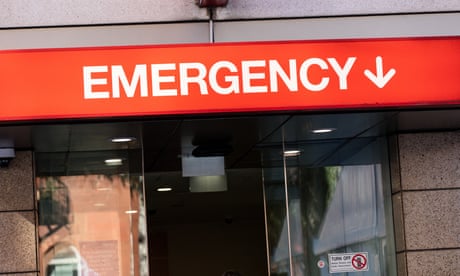- by foxnews
- 23 May 2025
‘Not just another wave’: Australia’s Covid hospitalisations reach record levels in several states
‘Not just another wave’: Australia’s Covid hospitalisations reach record levels in several states
- by theguardian
- 16 Jul 2022
- in news

Hospitals across the country are "bursting at the seams" as the number of people being admitted with Covid-19 reaches record levels in several states.
Western Australia recorded its highest number of Covid hospitalisations to date on Thursday, with Queensland also expected to surpass its January peak in coming days.
Meanwhile, hospitalisations in Tasmania and ACT are currently around double what they've been in any previous wave of the pandemic.
South Australia is hovering just short of its January peak, while rising numbers in New South Wales, Victoria and the Northern Territory still have some way to go before passing previous records.
NSW had more than 2,000 Covid patients in hospital this week for the first time since February, still some way off its January high of 2,943 but more than Victoria, Queensland and Western Australia combined.
Epidemiologist Adrian Esterman said the differing hospitalisation rates across the nation make for a "quite strange" picture - but one with a unifying theme.
"My understanding, from speaking to people around the country, is that every major hospital is at full capacity and bursting at the seams," the University of South Australia professor said.
"[Emergency departments are] absolutely chock-a-block."
And there is worse to come, with most states and territories likely several weeks away from their peak hospitalisation rates of this wave, he said.
"That will be when the pressure is really on, and we'll just have to see how they manage."
The current wave, driven by the BA.4 and BA.5 Omicron subvariants, has coincided with a "horrendous" hospitalisation rate from influenza. Hospitals in Victoria and Queensland this week confirmed they had postponed elective surgeries, with 6,500 health workers furloughed in the three largest states.
University of Queensland infectious diseases expert, Paul Griffin said Queensland was likely to surpass its hospitalisation rate record within days and was possibly still weeks off a peak.
He said hospitals were already having more people require treatment than could be given a bed. As well as deferring elective surgery, that meant hospitals were being forced to put patients in places that would "normally be transient areas for much longer periods of time than we would like them to be there".
"That's things like emergency department corridors and transit lounges," he said.
"People are getting stuck in places that are not designed to house patients."
Esterman said one of the most significant effects of the surge in cases was the immense pressure it was putting on hospital staff.
In a statement to Guardian Australia last month, days before hospitalisation rates in Victoria began to surge, Australian Nursing and Midwifery Federation Victoria branch secretary, Lisa Fitzpatrick, said staff were burning out under the "brutal and relentless realities of a pandemic".
"Our members report 'dark days' as a result of these pressures and many are understandably reducing their shifts, with some retiring early where they can to manage the burnout and exhaustion," Fitzpatrick said.
Queensland Nurses and Midwives' Union assistant secretary, Kate Veach, said these pressures were "intensified with many staff unable to work due to being unwell or off work to care for unwell family members".
"QNMU members across all sectors continue to report stress, burn out and exhaustion associated with understaffing and ongoing overtime performed to ensure patients and residents are cared for," she said.
But Griffin said a spiralling crisis in our hospitals was not inevitable.
"If we use boosters and antivirals and get people wearing masks and staying at home, we have the ability to control it, to some degree," the academic and director of infectious diseases at Mater Health Services said.
And he was hopeful people were starting to realise that: "this is a significant event, not just yet another wave."
Queensland is not helped by having the lowest rate of third booster jabs of any state, at about 59%.
Meanwhile, states have resisted calls to reintroduce mask mandates, with the acting Victorian premier this week confirming her government had defied health advice to do so.
Despite rising hospitalisation numbers in NSW, the premier, Dominic Perrottet, said on Friday that wide-scale mask-wearing mandates "is the time of the past".
"We need to have a limited role for the state to be mandating," he said.
But Perrottet said he would "absolutely" push for the federal government to reintroduce Covid isolation payments for casual workers at Monday's national cabinet, insisting it was "unfair" to enforce pandemic-era rules without providing financial support.
He said the decision to shorten the reinfection period from three months to 28 days would also have an effect on the public sector workforce.
"That will result in more people being in isolation and not able to go to work and that puts substantial pressure once again on our health teams in public hospitals [and] teachers going back to school next week. There are significant pressures right across the board."
- by foxnews
- descember 09, 2016
United Airlines flight returns to Hawaii after concerning message found on bathroom mirror; FBI investigating
United Airlines Flight 1169 to Los Angeles returned to Hawaii after a "potential security concern" aboard the plane. The FBI and police are investigating.
read more


